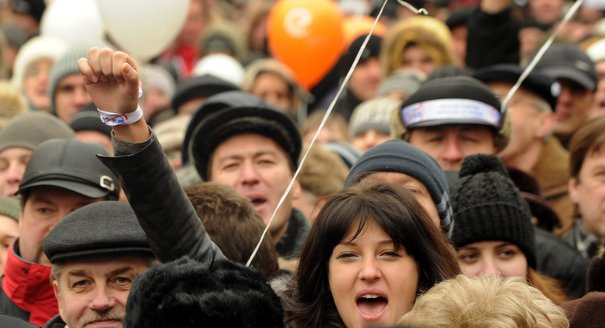Separated by thirteen years and ten days in the 18th century, the American and French revolutions remain an unfading symbol of triumphant pursuit of liberty: “As the liberty lads o’er the sea// bought their freedom, and cheaply, with blood,” wrote George Byron in his 1816 Song for the Luddites. In the United States and France these revolutions constitute the keystone of their national democratic myth, even though democracy did not emerge on the day Bastille fell or ink dried on the Declaration of Independence. In a striking contrast, I found a couple of years ago when researching the political mentality of today’s Russian middle class that the memories of the defense of the White House of Russia during the 1991 putsch played no significant, far less myth-making, role in their mentality, reasonably democratic and modernistic in many other respects. Do we lack democracy because we have no use for invigorating liberty myths, or do we need no myths because we are disappointed in democracy?
Disappointment is certainly a factor: whatever hopes we had two decades ago vanished in the struggle through recessions and tribulations of 1990s. But that is not the whole story. If in 1991 somebody had told you that in twenty years Mongolia and Moldova would have democracies (or at least peaceful transitions of power, working parliaments, and competitive elections), but Russia and Belarus would not, we would have laughed at such an unintelligent forecast. No surprise, Central European nations and, of Yugoslav republics, Slovenia made fast and (though not without reservations) successful transitions to democracy: their level of socio-economic development was reasonably high, and the strive to become “Europe” nearly consensual, and to be “Europe” these days you have to build a democracy. Equally non-surprising was the emergence of authoritarian regimes in Central Asia, and their mythology was used for state-building, not democratization. More surprising was the uneven but by and large genuine democratization in countries with a lower level of economic development (e.g., Bulgaria and Romania, and Mongolia), and traumatized by secessions or civil wars (Croatia, Serbia, and Moldova). The key factor there was the determination of political elites to build a regime allowing for conflict resolution domestically and facilitating the nation’s integration into the outside world. In Russia and Belarus, contrariwise, the ruling elite succeeded in establishing a firm grip over intertwined power-property assets, and any electoral competition is deemed a destabilizing factor and a danger: not surprisingly, it is the myths of conservative stability and immunity from foreign influences that are more popular in these countries than the images of liberty through revolution.
History is not over. Georgia, which seemed to be drifting into authoritarian tenets, survived the first change of government through elections in its history; Ukraine is entering another period of challenges for the incumbents… There are two kinds of lessons that revolutions can teach: either you democratize to avoid a revolution in the conditions when the public sees no other way to attain liberty, or revolutions will open a way to it. This rule does not work universally, but in Europe there seems to be no other way.
Boris Makarenko is chairman of the board of the Center for Political Technologies in Moscow.
